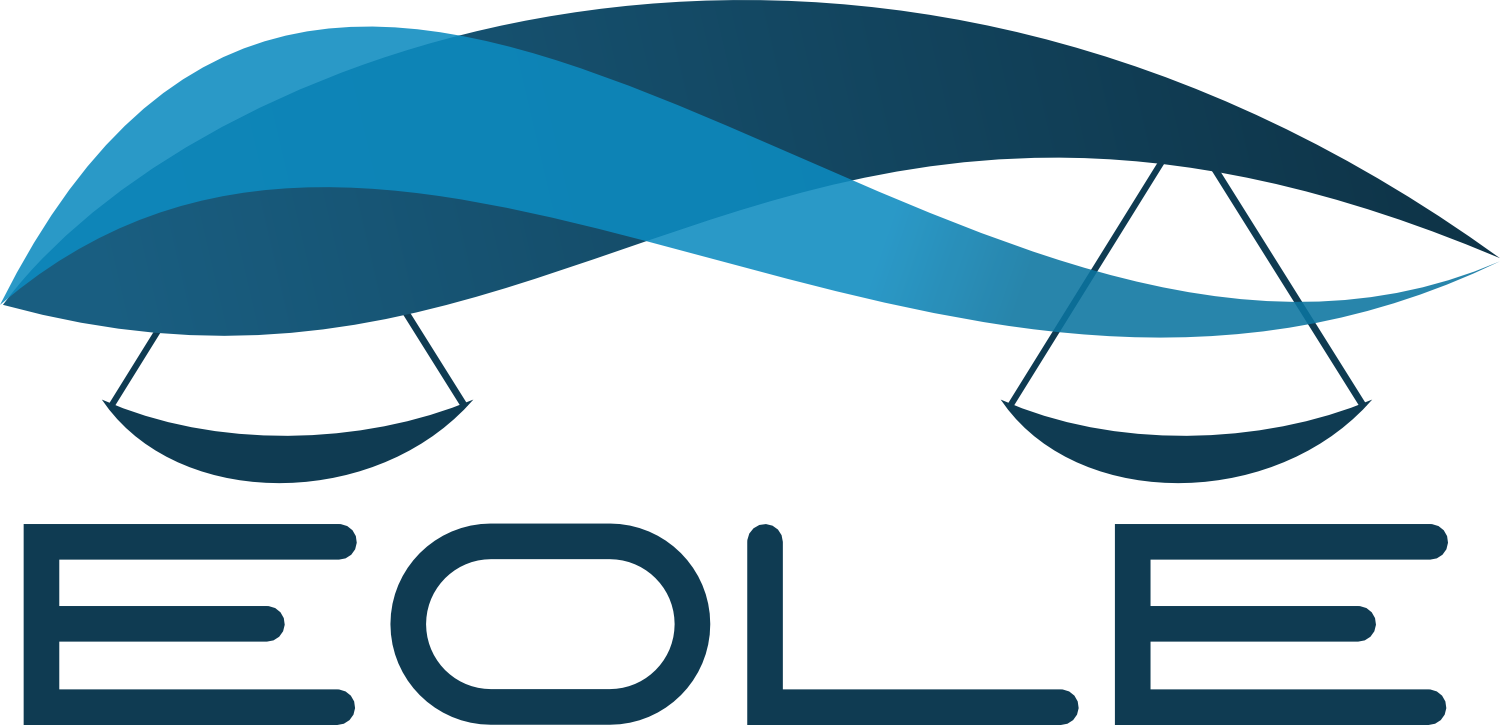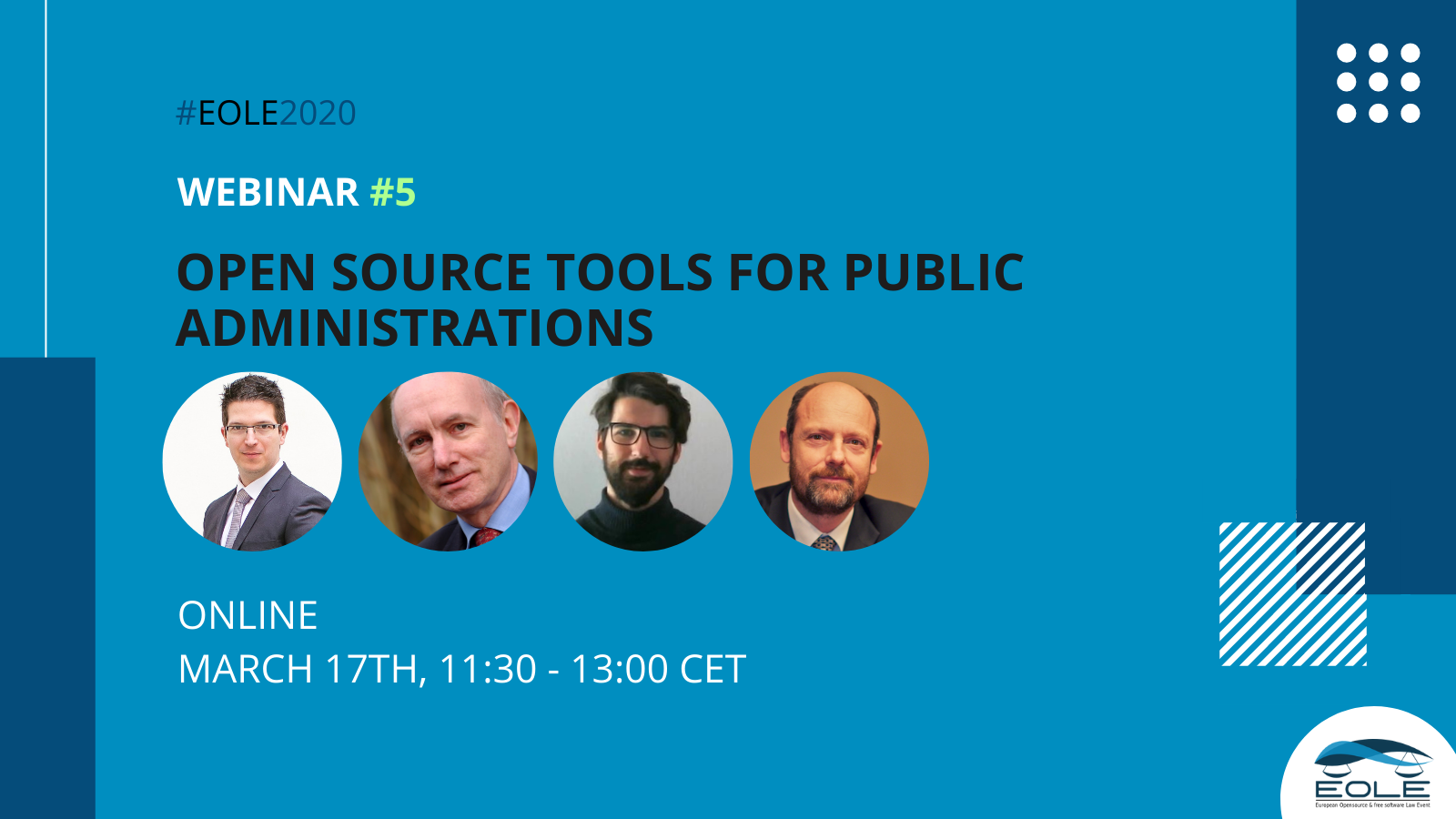International annual conference cycle, the European Open Source & Free Software Law Event (EOLE) aims to promote the share and dissemination of legal knowledge related to free software, as well as the development and promotion of good practices. Initiative born in 2008 from practitioners’ needs, EOLE has for purpose to develop a legal doctrine dedicated to the dissemination of neutral and qualitative information. This year and due to the pandemic, the one-day conference will finally be divided into 7 webinars and will take place from November 2020 to May 2021.
2020-2021 Thematic : « Legal aspects on free software in public administrations: hands on»
For a long time, Free and Open Source Software has been more a “potential” rather than a reality in Public Administration, dominated by large private sector IT contracts. In the last few years, however, Public Administrations around the world have really started to take FOSS seriously on a formal basis, with significant initiatives (such as laws fostering free software adoption or distribution by Public Administrations, and the EU “Join-Up” program).
This year’s EOLE webinars, held in association with the CSI Piemonte, will focus on the current legal issues of creating and using free and open source software in public administration.
Webinar 1 : Free software acquisition by public administration
November 25th, 11:30 – 13:00 CET
Nowadays free software is spreading more and more to the enterprise level: open source is no more the “enemy”. Why? Because it works! And the private sector is quick to pick up what works…
But what about the Public Administration? The public sector has reasons, unknown to the private sector, for choosing the “open alternative” : not only ethical reasons, but also principle as transparency, competition, public money spending, etc. And free software can also help to speed up the transforming process from a passive PA, as user, to a “pro-active” digital PA. So PA should be ready to consider software not only as a tool, but as a valuable asset for the growth of the society.
At the same time, PA must comply with specific procurement rules. In this picture, what elements are or could be involved in such a procurement process that can lead to more conscious and open procurement? More importantly, to what extent is the public administration really paying attention to the tools already available to guide a more “open” procurement process that allows for the consideration of open source software? Listening to both public and private actors, we will try to study tools and best (or bad) practices in PA and FOSS procurement..
This first webinar has been facilitated by Laura Garbati, lawyer at the CSI Piemonte (Italy), with :
Webinar 2 : Public sector collaborations around FOSS projects
December 16th, 11:30 – 13:00 CET
Nowadays free software is spreading more and more to the enterprise level: open source is no more the “enemy”. Why? Because it works! And the private sector is quick to pick up what works…
This webinar took a look at legal, governance and practical issues surrounding improving the use and release of open source software by public administrations. Legal issues in this area are no longer focused on licensing or even compliance (still important issues) but how to set up legal structures and frameworks to reinforce cooperation and sustainability of public sector open source projects – or explore the option to not have any formal framework and focus on grass level interactions to strengthen the community from the bottom up.
This second webinar has been facilitated by Malcolm Bain, IT law expert at Across legal (Spain) with :
- Pr. Barbara Gagliardi – University of Turin : Cooperation between public entities as a tool for the performance of public service available also in the ITC sector, according to EU directives on public contracts.
- Marc Pérez-Batlle – Barcelona City Council : Agile strategies for implementing more and better open source in public administration. Challenges and some suggested good practices.
- Andrew Katz _ Moorcrofts LLP and Finn Lewis _ Agile Collective : Building municipal open source governance structure from bottom up.
Webinar 3 : Open Source governance within public administrations
January 27th, 11:30 – 13:00 CET
Open source and free software advantages for public administrations and society at large are increasingly recognized and public policies to foster its adoption are spreading.
But even if nowadays we experience a change of pace, the road to open source and free software adoption by public administration was a long one. One of the clearest critical issue of this process was and remains the adaptation of public administrations’ organizational models to the practices of the open source and free software communities: it required, and requires, the adoption of innovative organizational practices and a cultural change.
This event dug into this dynamics, providing insights on the governance models of open source and free software projects by the public administrations in different scenarios: projects started by the public administrations, participation by public administrations in projects already under development.
This third webinar has been facilitated by Marco Ciurcina, Italian lawyer. (Italy) with :
Webinar 4 : Open Source & Open Science within public administrations
February 17th, 11:30 – 13:00 CET
The aim of this webinar is to draw up some observations on the place of open source within higher education and research and on the dynamics of open science. To this end, our four speakers will highlight the opportunities of open source in research, the current challenges concerning its implementation and the role that the law can play (brakes and levers).
It is therefore the place of open source as an empowering element of open science that will be discussed as well as the conditions necessary for legal tools to participate in its dynamics.
This fourth webinar will be facilitated by Célya Gruson-Daniel, doctor of social sciences and consultant at Inno³, and with the intervention of:
- Alexandra Giannopoulou – Postdoctoral Researcher at Blockchain & Society Policy Lab (Netherlands)
- Carlo Piana – Lawyer, partner at Array (Italy)
- Alexis Drogoul – Representative of IRD in Vietnam and Philippines (France)
- Myriam Ayass – Section leader, IP management and KT policies at CERN (Switzerland)
Webinar 5 : Legal tools for public administrations to sustain the us of Open Source
March 17th, 11:30 – 13:00 CET
Whether it’s a question of responding to the complexity — both technical and contractual — associated with the use of open source components, or standardizing individual practices in a systemic and supply chain approach, organizations are relying on tools that ensure better appropriation of open source. These tools simplify the use of Open Source, foster the compliance with Open Source licenses, and facilitate and secure the mutual sharing of resources between organizations. They can be implemented in a variety of ways: software, best practices, contractual templates and framework, etc
Due to the increasing place of digital services within public policies, administrations are increasingly exposed to the use of such generic tools. In addition, specific resources can be used to consolidate, standardize and facilitate the Open Source approaches of these administrations: in a context of purchasing, public partnerships or other digital strategies. During this webinar, some of these tools adopted to sustain the use of open source will be shared and discussed in order to foster their adoption by other administrations.
This fifth webinar will be facilitated by Benjamin Jean, Founder and CEO of Inno³, and will welcome :
- Patrice-Emmanuel Schmitz – Lawyer, ICT practitioner and legal expert in the framework of www.JOINUP.eu (Belgium)
- Marco Conoscenti – Doctor-researcher at the Nexa Center for Internet and Society (Polytechnic University of Turin (Italy)
- Malcolm Bain – IT law expert at Across legal (Spain)
Webinar 6 : Open Source Programme Office (OSPO) for public administration
April 21st, 11:30 – 13:00 CET
Whether it’s a question of responding to the complexity — both technical and contractual — associated with the use of open source components, or standardizing individual practices in a systemic and supply chain approach, organizations are relying on tools that ensure better appropriation of open source. These tools simplify the use of Open Source, foster the compliance with Open Source licenses, and facilitate and secure the mutual sharing of resources between organizations. They can be implemented in a variety of ways: software, best practices, contractual templates and framework, etc
Due to the increasing place of digital services within public policies, administrations are increasingly exposed to the use of such generic tools. In addition, specific resources can be used to consolidate, standardize and facilitate the Open Source approaches of these administrations: in a context of purchasing, public partnerships or other digital strategies. During this webinar, some of these tools adopted to sustain the use of open source will be shared and discussed in order to foster their adoption by other administrations.
This sixth will be facilitated by Malcolm Bain, IT law expert at Across legal (Spain) and will welcome :
- John Whelan – ICT Commercialisation Manager at Trinity College (Ireland)
- Leonardo Favario – Open Source Project Leader of the Department for the Digital Transformation at the Italian Government (Italy)
- Gijs Hillenius – Open Source Programme Office at European Commission (Belgium)
- Philippe Bareille – Open Source Officer at Mairie de Paris (France)
Webinar 7 : Conclusion of this 13th edition
June 16th, 11:30 – 13:00 CET
The 7th webinar concludes the 13th edition ! The goal of this last webinar is to share our insights about what was discussed and to work together on what we can do in the future.
Facilitators present and give their insight on each one of the season’s conferences :
- Free software acquisition by public administration – Laura Garbati
- Public sector collaborations around FOSS projects – Malcolm Bain
- Open source governance within public administrations – Marco Ciurcina
- Open science and open source – Célya Gruson-Daniel
- Tools for public administrations – Benjamin Jean
- Open Source Programme Office (OSPO) – Malcolm Bain
- Gathering questions/roundtable

